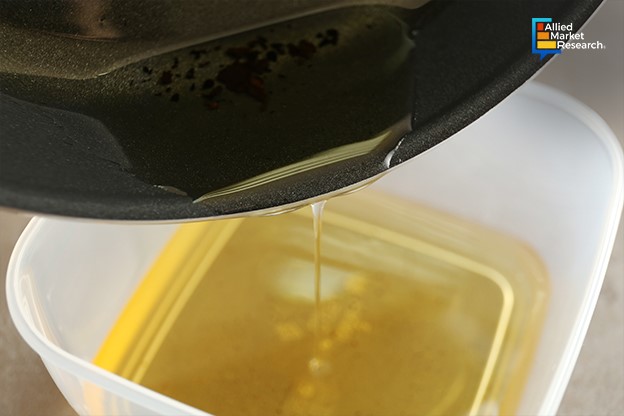How Can the Recycling of Used Cooking Oils Expand the Scope of Your Business?

5 Feb
2024
Focal points:
- Diversifying use cases of recycling used cooking oil
- Points that businesses should look for in a used oil recycling company
- How many times can restaurants reuse cooking oil?
- Profitable acquisitions in the domain
Cooking oils are essential for every household and food processing chains such as restaurants, fast-food centers, and many more. However, the matter of concern is the leftover cooking oil that stays behind in every kitchen. Used cooking oil, also abbreviated as UCO, can be defined as the oil and fat that have been used for cooking and frying. It can be available as vegetable oil including corn oil, olive oil, groundnut oil, palm oil, and animal fats. It is often heard that using leftover cooking oil again and again is not good for health. Nevertheless, the wrong disposal of used cooking oil can also be harmful to the environment. In this article, we will talk about how used cooking oil can be recycled effectively, fulfilling various purposes without causing any harm to the environment and human health.
How can the right disposal of used cooking oil open up new avenues for businesses?
The inappropriate disposal of used cooking oil has given birth to many environmental problems at a soaring rate. To combat such issues, many businesses have developed alternative disposal options to reduce the environmental impacts and use UCO in a better way. Some of the major ways to use such oils in a wise manner are discussed below:
- Preparing biofuels: In the present age, people have shown more interest in adopting greener practices to heal the environment. Creating biofuel from used cooking oil can be a great initiative that can help eradicate terrible environmental consequences. Biofuel, also known as biodiesel, can be recycled from any kind of vegetable oil or animal fats and can provide a renewable and high-quality fuel alternative, enabling the Earth to fight against the effects of global warming effectively. Biodiesels are formed by an intricate chemical process called “transesterification” that separates the vegetable oil or fat from glycerin, and the resulting products are biodiesels which are scientifically called methyl esters and glycerin. Moreover, glycerin can act as a useful product for various applications in the food, medical, pharmaceutical, and personal care industries.
- Making cosmetics: Oil serves as an important element in preparing cosmetics such as foundations, creams, moisturizers, lipsticks, and concealers. Many leading cosmetic brands have stepped ahead to recycle cooking oil and use it in manufacturing their products, promoting sustainable make-up.
- Soapmaking: Used cooking oil can act as a key ingredient in sustainable soap and detergent production. Along with caustic soda flakes and water, UCO can be used to form biodegradable cleaning and body-wash products, addressing the global problem of UCO disposal and promoting a circular economy. Due to emerging environmental concerns, many countries have adopted sustainable practices for UCO disposal, among which India is expected to lead the trail by manifesting the highest CAGR of 6.7% during the 2023-2032 period.
- Furniture polish and conditioners: Individuals having wood furniture can relate to this easily. Wood furniture looks dull or gets scratched with time. However, UCO can contribute to making a mixture using distilled white vinegar in equal proportions that can help restore the look of the furniture.
What should food businesses look for in a used cooking oil recycling company?
Big restaurant chains or huge food businesses should partner with some reliable recycling company that will make the disposal of used cooking oil with all commitments. Before tying up with any oil recycling company, food businesses should check their company history, to verify how long they have been in business, whether they are adequately insured, their Google ratings, and whether the company provides any references.
Furthermore, the restaurants should also check whether the disposal company is a full-service company or not. They should also verify whether the disposal company power washes the area surrounding your oil bin and cleans the grease trap or not.
How many times is it safe for restaurants to reuse cooking oil?
For large-scale restaurants, reusing cooking oil depends on various factors such as the type of oil being used, the length of time the oil is used, and most importantly the cooking temperature. As per research, frying oil can be reused a maximum of 8 to 10 times. Many fast-food restaurants across the globe have started filtering their oil daily and replacing it with new oil once a week. Moreover, some bigger chains have developed their custom blend to capture the properties of the oil such as their flavor, longevity, and temperature resistance.
Embracing sustainability: Some beneficial acquisitions
The used cooking oil industry has witnessed several profitable mergers and acquisitions. For instance, in November 2023, OMV Petrom, a Romanian integrated oil company announced the acquisition of Respira Verde, a leading Romanian used cooking oil collection specialist. With this acquisition, the company aims to produce sustainable aviation fuel and biodiesel from used cooking oil, reducing the carbon footprint of the transportation sector.
To sum up, the sector is witnessing remarkable growth due to the rising awareness of environmental sustainability among businesses globally. Moreover, the increasing advancements in waste-to-energy technologies will bring immense opportunities for the domain in the coming years.
To identify new market segments in the used cooking oil industry and emerging opportunities, feel free to talk to our esteemed analysts today! They can also support your business investment decisions and help you attract new investors.

Rosy Behera
Author's Bio- Rosy Behera holds a bachelor’s degree in Electrical and Electronics Engineering and now she is a content writer by profession. She loves to portray her thoughts and ideas with a nice command of words. Grabbing an audience with her creative write-ups is one of her biggest assets so far. Apart from writing, she is a certified “Odisi” dancer and has done Gardharva in Drawing, Painting, and Arts. She always explores new things through travel and is a big foodie.
Which Types of Specialty Sugars Can Aid Your Business with Customizable and Healthier Food Offerings?
Avenue: Entire Library membership of Allied Market Research Reports at your disposal
- Avenue is an innovative subscription-based online report database.
- Avail an online access to the entire library of syndicated reports on more than 2,000 niche industries and company profiles on more than 12,000 firms across 11 domains.
- A cost-effective model tailored for entrepreneurs, investors, and students & researchers at universities.
- Request customizations, suggest new reports, and avail analyst support as per your requirements.
- Get an access to the library of reports at any time from any device and anywhere.
Related Post
-
How are Submarine Cables Transforming Global Connectivity with Enhanced User Experience?
-
Endoscopy Procedures: Transformations in Techniques and Applications
-
AI-Powered Video Analytics: How the Product Actually Works for enterprises
-
Painting Robots: Transforming Precision Coating and Creative Applications
-
Innovations in Pharmacovigilance Systems Advancing Patient Safety
-
Understanding Edge Security: Keeping Data Safe Near the Source
-
Exploring the Use and Advancements of 3D Laser Scanners in Professional Applications
-
Reinforcing Industrial Controls with Smarter Tools and Training








